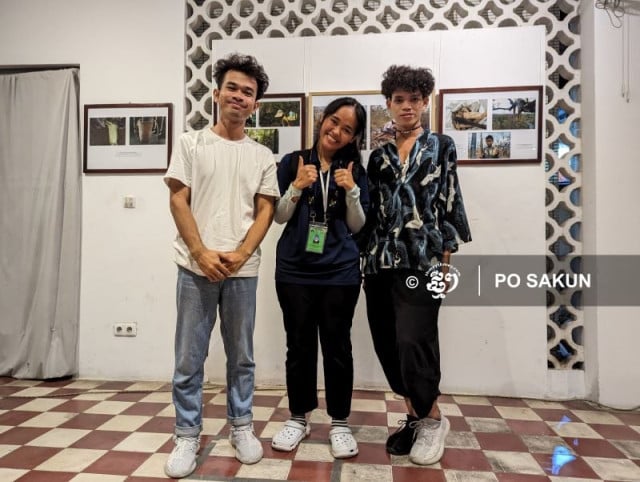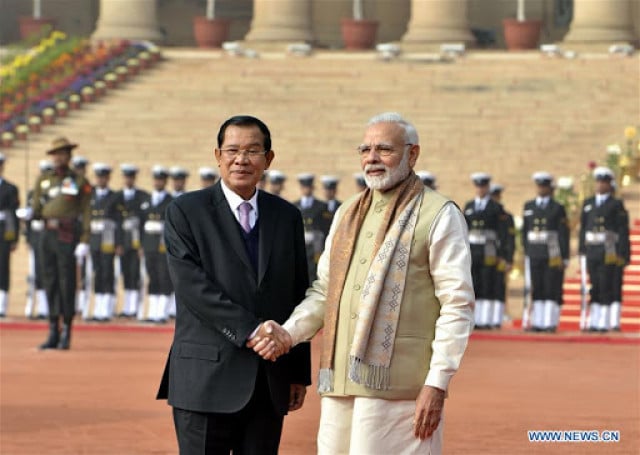Young People Want More Schools in Film Industry

- By Po Sakun
- August 28, 2023 5:48 PM
PHNOM PENH – Young Cambodians who are interested in filmmaking want more short and long training courses related to the film industry, especially to improve their scenario-creating and film-directing skills. It is hard to find schools to teach them, they say.
To combat the shortage of training, the Bophana Center invited on July 12 a veteran screenwriter, Pol Pisey – who is also the vice-president of the Khmer Writers Association – to share her experience on writing scenarios, poems, songs, radio dramas, and novels.
Around 30 young Cambodian aspiring film writers attended the course.
Piseth Maratong, a 21-year-old sophomore student majoring in technical camera skills at the local NGO Pour un Sourire d'Enfants (PSE), was one of them. He said the presentation was important for young people, like him, who want to get involved in the film industry.
The training helped him better understand how to develop a character’s personality, which is one of the most important elements of a good story plot.
“When writing a story, [the writer] must know the characters’ personalities clearly to avoid mixing them up, meaning that we [should] start with knowing characters before beginning to write the story…I didn’t know that. I have faced the problem before: I got lost in my story and didn’t know how to end it because I was not clear about my characters’ personalities,” Maratong said.
The student, originally from Kampong Thom province, thinks the film industry in Cambodia has improved when it comes to filming techniques. But script-writing and directing skills are still limited and not many schools exist to teach them.
While he dreams of working in the film industry, Maratong wants to see greater movie and plot standards in the country.
Like Maratong, Han Mesa attended the training. At 23, he wants to become an actor, a director, and a screenwriter. But he has also faced issues with writing stories and building characters’ personalities.
“I have a good level of Khmer and I like writing. But the more I write, the more I get confused with my characters which in the end blocks me in my writing,” he said, adding that the training helped him sharpen his characters” identities.
Writing answers to clear rules
Another participant from Kampong Thom, Chhae Channika, wants to be a film director. She is currently studying technical camera skills and practicing scenario writing at the same time.
Channika said that only studying at the school is not enough to develop her skill in scenario writing because her teachers are not skilled enough and can only share the limited knowledge they have.
As someone who likes reading books, observing, and learning about people’s lives, Channika thought writing could also start with imagination. However, she now knows that writing also answers to specific rules.
“We study by practicing and doing research by ourselves. I used to do research on screenwriting too, but learned little from it. Because teachers mainly focus on technical camera skills at school, they can share with us some on the writing but also told us to do more research on it because they are not skilled in it,” she said.
Pol Pisey, the trainer who hosted the course, has been writing scenarios, novels, poems, and songs for years. She said there are six stages before writing a story: (1) the writers must know what theme they want to write a story on and (2) gather relevant information about it. Once they’ve completed this documentation work, (3) they write a short summary of the story; (4) they then prepare a longer summary of the story; (5) after that, they work on the structures; (6) lastly, they divide the story into scenes.
“For example, if we want to write about domestic violence, we gather the information related to violence. If we have gathered 10 points about it, we then can summarize it into a short [story]. That is what we call theme,” she said.
Pol Pisey said she does not hold any degree in script writing but has been gaining experience while practicing. She now wants to share the good practices she developed with a new generation of filmmakers.
And her experience has been appreciated: Although she has a hectic schedule, every trainee said they want her to come back to teach them in future training sessions.
Pok Borak, director of the Ministry of Culture and Art film department, once said that building a film school requires a substantial budget and high-quality human resources, so cooperative partners are needed.
Originally written in Khmer for ThmeyThmey, this article was translated by Meng Seavmey for Cambodianess.















